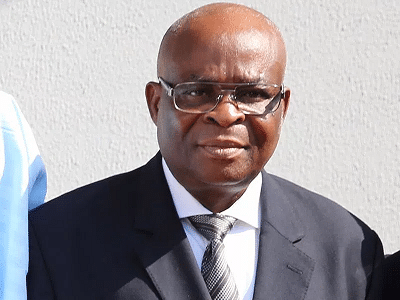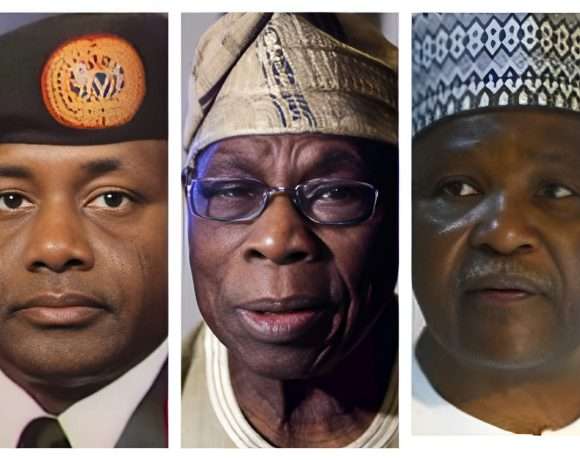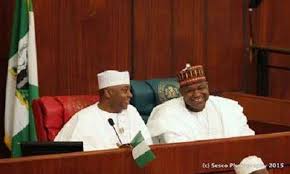Onnoghen’s suspension: S’Court strikes out Senate suit

…As embattled CJN asks CCT Chairman Umar to hands-off his trial
Andrew Orolua, Abuja
The Supreme Court on Tuesday struck out the suit filed by Senate challenging the suspension of the Chief Justice of Nigeria, Justice Walter Onnoghen, by President Muhammadu Buhari. The Senate filed the suit before the Supreme Court against the Federal Republic of Nigeria following the unilateral suspension of Justice Onnoghen from office after he had been charged before the Code of Conduct Tribunal for non-declaration of assets. When the matter came up on Tuesday before a full panel of the apex court, the Senate announced the withdrawal of the suit. Lead counsel to the Senate of the Federal Republic of Nigeria, Paul Erokoro (SAN), leading Ikechukwu Ezechukwu (SAN) and others who announced the withdrawal informed the court that the plaintiff had filed an application to discontinue the case. “We filed a process on Monday and served the parties,” Erokoro said. Counsels to the Federal Government, Maimuna Lami Shiro and T. A Gazali, who represented the Attorney General of the Federation did not oppose the plaintiff application. Justice Bode Rhodes-Vivour, consequently struck out the suit. Disappointingly and surprisingly too, the All Progressives Congress (APC) Senate caucus represented by Chief A. A. Adeniyi who was seeking to be joined as co- defendants left without any role in court. Erokoro did not elaborate why the Senate had withdrawn the suit. However, sources close to the Senate said it became expedient as the matter has been taken over by the National Judicial Council (NJC) who had queried the suspended Chief Justice of Nigeria, Justice Onnoghen and Justice Ibrahim Muhammad. Meanwhile, the suspended Chief Justice of Nigeria, Walter Onnoghen, has asked the Chairman of the Code of Conduct Tribunal, Danladi Umar, to disqualify himself from further participating in the hearing of his case on grounds of likelihood of bias. He alleged that the chairman had constructively convicted him without hearing him or formally arraigning him before the tribunal. Onnoghen stated that the CCT chairman is a tainted arbiter because he is facing a bribery charge filed against him by the Economic and Financial Crimes Commission and could trade the charge to convict him for a plea bargaining. He stated this in a Motion on Notice brought pursuant to Rule 12(1) and (1A) of the revised Code of Conduct for judicial officers of the Federal Republic of Nigeria, 2016, filed in the registry of the CCT on Monday. Listed as counsel in the motion are Chris Uche (SAN), Chief Sebastine Hon (SAN), Okon Efut (SAN), Chief Ogwu Onoja (SAN), Noah Abdul and George Ibrahim. Onnighen through his lawyers stated that Umar had authored and signed an ex-parte order directing an unconvicted man to step aside as the CJN on account of a charge not yet before him, which is in itself a conviction prior to arraignment and plea/trial. President Muhammad Buhari had on January 25 suspended Onnoghen and swore-in Tanko Muhammad as acting CJN based on an ex-parte order granted by the CCT Chairman. In his grounds of application, he stated: “The Chairman on January 23, 2019 entertained a motion ex-parte not moved by any known prosecutor bearing the same title, charge number and purported accused person/defendant which substantially predetermined the guilt of the defendant without an arraignment. “Consequent upon paragraphs IV above, the learned chairman (Hon. Danladi Umar) who purportedly moved, made and signed the order has put himself in the position of the prosecutor, judge and jury to the clear prejudice and bias against the Defendant. “The learned chairman of the CCT is a tainted arbiter by reason of a criminal charge at the instance of Economic and Financial Crimes Commission for receiving money bribe in the sum of N10m in charge No: CR/109/18 in FCT High Court by an organ under the supervision of the office of the Attorney General of the Federation, incidentally the prosecutor and complainant in this matter, such that with such sword of Damocles hanging over him, and himself not likely to be a fair arbiter, but instead more likely to trade in the charges against him in quasi plea bargaining in the charge against him and enter summary conviction in this proceedings to please the prosecutor.”







